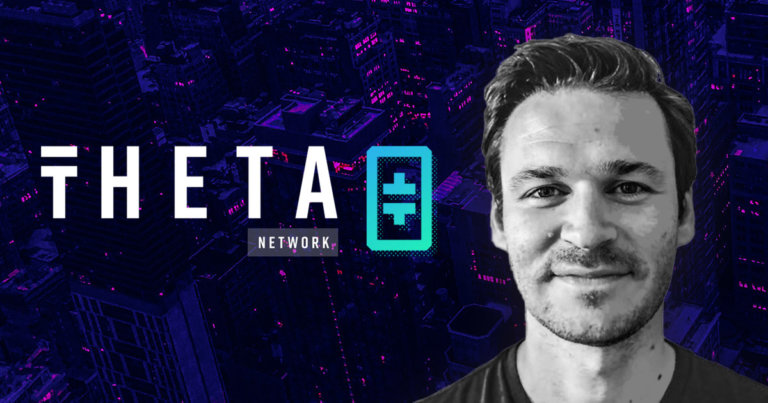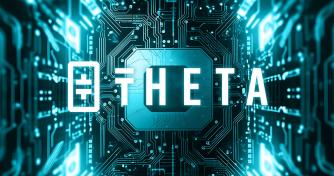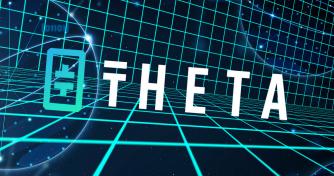 Theta’s Head of Strategy talks purpose-built blockchains, major partnerships and future roadmap
Theta’s Head of Strategy talks purpose-built blockchains, major partnerships and future roadmap Theta’s Head of Strategy talks purpose-built blockchains, major partnerships and future roadmap
Wes Levitt is the Head of Strategy for decentralized video delivery network Theta Labs.
CryptoSlate recently had the opportunity to chat with Theta’s Head of Strategy, Wes Levitt. Theta is creating a more efficient, decentralized network for delivering video and other data between connected devices.
Wes Levitt is Head of Strategy for Theta Labs, where he works on corporate strategy, marketing and press relations, and analytics. He has been a speaker on blockchain topics at conferences like the New York Media Festival, Blockchain Connect, and NAB Streaming Summit among others. Prior to joining Theta Labs, Wes spent 8 years in investment roles in real estate equity and securitized debt. He holds a BS in Economics from the University of Oregon and an MBA from UC-Berkeley Haas School of Business.
Interview with Wes Levitt, Theta Head of Strategy
What is the professional background of the Theta founders and what is their previous experience in crypto?
Theta CEO Mitch Liu has an extensive background in media and gaming. He co-founded Gameview Studios best known for its Tap Fish mobile game franchise with nearly 100 Million downloads. The company was acquired by DeNA, a leading Japanese mobile gaming company within 6 months of launch. Prior to that, he co-founded Tapjoy in 2007, a pioneer of rewarded social and mobile video advertising, and grew that company to $100MM in revenues.
He received a BS in Computer Science & Engineering from MIT, completed his thesis research at MIT Media Lab “Interactive Cinema” video group and received an MBA from Stanford Graduate School of Business.
CTO Jieyi Long leads the Theta Labs technical team and developed multiple U.S. patented technologies related to decentralized data streaming and live VR streaming. Prior to Theta Labs he served in senior technical roles at MadSkill Game Studios, Synopsys, and Magma Design Automation. He received a B.S. degree in Microelectronics from Peking University in Beijing, China. He also received a Ph.D. degree in Computer Engineering from Northwestern University in Evanston, IL where he conducted research in mathematical modeling and algorithms to optimize distributed electronics systems.
What problems is Theta solving?
Theta is creating a more efficient, decentralized network for delivering video and other data between connected devices, which reduces the cost of delivery for video platforms and improves their bottom line. The introduction of token rewards for end users also drives higher user engagement, longer watch times, and more recurring visits which all lead to higher market share.
How many people are working on Theta and where is the team located?
There are currently 25 people at Theta Labs, primarily in San Jose / Bay Area, as well as satellite offices in Seoul and Amsterdam.
Other than digital collectibles, what is Theta’s long-term outlook for NFTs? What additional use cases will emerge that have not been implemented yet?
We see a huge opportunity in the connection of NFTs with real-world items and events. Some of the crypto streamers releasing NFTs on Theta already are tying their NFTs to one-of-a-kind experiences and offline items which will be announced shortly.
Also, with the easing of Covid restrictions, we are very excited about the return of live events, and how NFTs can be used for ticketing – a big improvement because NFT linked tickets are easily transferrable, yet are provably authentic and scarce.
What is the strategic advantage of partnering with Sony Europe?
Sony Innovation Fund was an early investor in Theta Labs, so we have been discussing potential collaborations for some time now. As Sony Europe’s R&D Lab started focusing on blockchain technology, it made sense to work together to bolster the security and consensus of Theta blockchain with the launch of their Theta Validator Node.
What does the Lionsgate and Cinedigm partnership mean for the future of Theta?
It’s critical that major brands and enterprises get experience in the blockchain space, and these partnerships are often the first steps for them to do that. As Theta onboards more of these key partners, the protocol is developing a reputation as the blockchain that is purpose-built for media and entertainment and can be the right first step into the blockchain space for a company.
What are some of the technological advantages of the Theta blockchain? Is it building upon any existing blockchain frameworks?
Theta is primarily new code built from the ground up, though it does incorporate some design elements from the Tendermint consensus. Building on that base, Theta’s multi-BFT consensus model balances a large group of 3,500+ community-run Guardian Nodes with a core group of Enterprise Validator Nodes, run by groups like Google Cloud, Sony Europe, Samsung Next, and Blockchain Ventures. This allows fast consensus among the validator set, but without sacrificing decentralization as transactions are finalized among the larger permissionless Guardian Node set.
Theta has also made great strides in ultra-high-throughput blockchain micropayments to facilitate decentralized networks, for which it has been awarded several U.S patents.
What are the challenges of building a purpose-built blockchain? How will Theta achieve decentralization of its usage and governance?
One challenge is compatibility with other blockchains. Launching a new ERC20 token is relatively easy since the infrastructure is already fully in place for Ethereum-based tokens; for Theta, we had to build much of it out ourselves. That has taken time but is now largely complete, and was aided by the fact that Theta uses similar cryptography and is EVM-compatible, which for example means any Ethereum smart contract can run on Theta blockchain without any code adjustments.
What can you tell us about the Theta product roadmap? What will be the most important upgrades of the Theta mainnet 3 upgrade?
The biggest change for Mainnet 3.0 is the introduction of Elite Edge Nodes, a stronger, more robust network of nodes to deliver decentralized video streams. These nodes will allow users to stake TFUEL tokens and earn additional TFUEL as a reward for having high uptime and network availability. This additional incentive is intended to drive larger numbers of always-on Edge Nodes that will make the Theta Network more effective for video delivery.
What is the utility of the Theta token?
Theta Token (THETA) is the governance token of the Theta protocol. THETA is used to stake as a Validator or Guardian node, contributing to block production and the protocol governance of the Theta Network. By staking and running a node, users will earn a proportional amount of the new TFUEL generated. The supply of THETA is fixed at 1 billion and will never increase.
Theta Fuel (TFUEL) is the operational token of the Theta protocol. TFUEL is used for on-chain operations like payments to Edge Node relayers for sharing a video stream, or for deploying or interacting with smart contracts. Relayers earn TFUEL for every video stream they relay to other users on the network. You can think of Theta Fuel as the “gas” of the protocol. There were 5 billion TFUEL at genesis of Theta blockchain, and the supply increases annually at a fixed percentage set at the protocol level.
Where do you see the Theta ecosystem over the next few years? What will be the major milestones?
In the next few years, we see Theta evolving to serve as a decentralized delivery network for any data type. We think there are a lot of opportunities in relaying of game patches, OS updates, and other file types where there are the right network characteristics for peer-to-peer networks like Theta. You have many concurrent users downloading these files simultaneously, sometimes millions at a time, which is ideal to create high peer availability for p2p networks.
What is the best way for those interested to learn more about Theta?
The best way is to start with our Theta Documentation and GitHub, and to follow us on social channels here:
Connect with Wes Levitt
Wes Levitt is Head of Strategy for Theta Labs, where he works on corporate strategy, marketing and press relations, and analytics.
















































































































